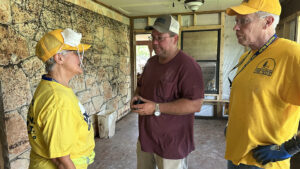
RICHMOND, Va. (BP)–Southern Baptist missionaries must make common-sense preparations for possible disruptions of their lives caused by the Y2K computer software bug, says an International Mission Board special task force.
And no matter how seriously Y2K disrupts people’s lives, God’s mission to redeem a lost world will prevail, they add.
The board’s Y2K Task Force, led by Jerry Burkett, the agency’s vice president for global information systems, is developing contingency plans to help missionaries deal with Y2K interruptions. Their work will continue beyond the spring of 2000.
“The Y2K bug is a man-made problem that can be overcome and no matter how significant the bug is our mission will prevail,” Burkett wrote in the task force’s first report to IMB administration and trustees. “If we are prepared personally and as an organization by having contingencies in place, we will be better equipped to carry out our mission with greater freedom.”
The Y2K problem stems from 30-year-old computer coding practices that saved computer memory by referring to a year only by its last two digits. Now that the first two digits of the year are about to change — on Jan. 1, 2000 — computation errors and other software malfunctions are expected to occur in programs that still use the old computer codes.
Most experts believe the United States is far better prepared than most of the rest of the world and will experience fewer serious disruptions as a result. The IMB task force is assessing and addressing potential concerns outside the United States. Four mission-critical areas have been identified: physical needs, banking and finance, transportation and electronic communication.
Governments, industry and businesses worldwide are spending billions of dollars to head off problems, Burkett said, but there will be significant overseas consequences due to the software bug. Missionaries must do their best to stay informed and consider reasonable courses of action for contingencies.
“The potential Y2K fallout could best be compared to a looming hurricane,” Burkett said. “There is no need to panic, nor is there any reason not to exercise good judgment in preparation for some unforeseen eventualities.”
The task force is reviewing Y2K preparedness in each of the IMB’s 14 geographical regions of work and offers specific suggestions to help missionaries prepare for possible disruptions of their ministries. As new information is received, an electronic version of the report will be updated and provided to missionaries.
A Y2K congressional subcommittee has said all countries will be affected to one degree or another by Y2K-related failures:
“Problems in one country or sector can have widespread consequences because of interdependence between sectors worldwide. The consequences of Y2K failures abroad will range from the relatively benign, such as a localized inability to process credit card purchases, to problems … that will have humanitarian implications such as power loss in mid-winter.
“There are few indications that countries are undertaking contingency planning for recovery from Y2K failures. … Global linkages in telecommunications, financial systems, air transportation, the manufacturing supply chain, oil supplies, and trade mean that Y2K problems will not be isolated to individual countries, and no country will be immune from failures in these sectors.”
Among the ways the report says missionaries can prepare for Y2K disruptions:
— Obtain paper copies of all electronically stored personal documents before year end.
— Maintain original copies or photocopies of all vehicle and property registrations.
— Back up computer records, files and programs.
— Plan for cash on hand.
— Store additional heating fuel.
— Fill vehicle fuel tanks prior to Dec. 31.
— Store additional nonperishable items to last four to eight weeks.
— Store appropriate medicines, including early purchase of prescription medicines when possible.
— Store additional bottled water to last four to eight weeks.
— Have batteries on hand for flashlights and radios.
The board also has designed and will test a communications plan to ensure leaders can receive continual updates from field personnel and monitor international developments. The plan focuses on communications via telephone and electronic mail.













